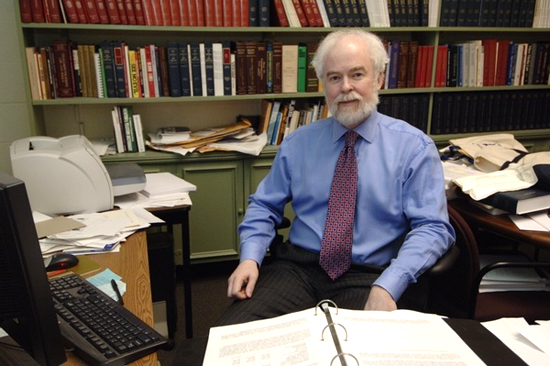Vanishing from an Archive Near You: History?
COM’s Carter on the tussle between truth and privacy

COM’s T. Barton Carter disagrees with calls for purging old stories from news media archives. Photo by Vernon Doucette
Arrested in 2010 for a minuscule possession of pot, Connecticut nurse Lorraine Martin had her bust expunged from the court record after agreeing to drug classes. To her chagrin, however, she found employers rejecting her for jobs, for a reason she discovered after googling herself: archived news stories of her arrest, online for all to see.
Martin is suing several media organizations for defamation, even though the archived stories reported historical truth. Writing about the case last month, Bill Keller of the New York Times cites other instances of people asking his paper to strike stories about them from its archive. The “most heartbreaking,” he writes, involved a teacher whose students googled her and found a moldering headline: as a toddler, the woman had accidentally pulled her baby siblings from their crib and killed them in the mistaken belief that they were dolls.
The Times refuses to destroy archived articles, Keller writes—his column is headlined “Erasing History”—instead choosing to update them to reflect acquittals or dismissals. He added that some papers try to compromise by placing search engine deflectors in archived stories, which then become viewable only via the papers’ archives.
Meanwhile, most states have expunction laws, says T. Barton Carter (COM’78), a lawyer and a College of Communication professor of communication and law.The debate pits our obligation to truth and history against people with real hardships (another Times story explains how exonerated citizens still face discrimination from prospective employers and others). Carter, who discussed the issue with BU Today, notes that from archived stories to social media postings and ubiquitous cameras in phones, “Privacy may itself be a vanishing right.”
BU Today: Keller compares the efforts to expunge archives to Stalinist Russia. Do you agree?
Carter: I don’t think I’d go as far as Stalinist Russia. On the other hand, you are, to a certain degree, trying to rewrite history, saying something was true at one point in time and subsequently is not true. The problem has existed for a long time in limited form, pre-internet. You had cases where newspapers would publish “pages from our past.” And if the headline said, “So-and-so convicted of X,” and later it was expunged, you had the same problem on a small scale.
Did anyone ever sue over that?
Yes. They ended up winning—the newspaper did—but it does raise the same question. The problem now is everything lives on the internet forever and is disseminated on a massive scale. That has led to this idea of the right to be forgotten, which has gotten currency in Europe, where they (a) treat privacy a lot stronger and (b) don’t have a First Amendment.
For example, there’s a Spanish campground. Years ago, there was this horrendous bus accident explosion with lots of people killed, just outside the campground. The campground had nothing to do with it. But when you do a search for that campground, the first story that comes up every time is the horrific explosion. This is not exactly helping their business. But it did happen. The campground complained to a privacy commission; nothing has happened yet.
Do you think the Connecticut woman will win her suit?
I would think the odds would be against her, probably on First Amendment grounds. But it raises a more interesting question: when is the truth not the truth?
Do you have sympathy for the plight of those wrongfully convicted who find their record unexpunged and face prejudice, such as in getting employment?
Clearly, you have sympathy in those cases. We may have the saying “innocent till proven guilty,” but a lot more people believe that “where there’s smoke, there’s fire,” which is unfortunate. And the state has an interest in trying to prevent people from having this effect on their lives.
You agree with Keller that “erasing history” is not the way to meet that interest?
To say it’s all right to rewrite history—the ultimate end of that would be Orwell’s 1984.
Inserting code in articles that prevents them from being retrieved by a search engine—is that a legitimate compromise?
My problem with that is it’s sort of like being slightly pregnant. It’s historical fact for some people but not for others. An alternative might be linking the original story to the subsequent story of the exoneration. But again—think of the three Duke lacrosse players falsely accused of rape in 2006. If I search for one of them and get the stories, would I get the others or not? You’re getting some really messsy line-drawing as to when and under what circumstances. The day you published it, somebody else may have picked it up and republished it. There’s almost no way to put the genie back in the bottle.
You don’t support destroying archived newspaper stories, and you don’t see the utility of preserving archives, but blocking Google searches. Is there nothing we can do?
I don’t have an idea yet on how you’re supposed to solve it. This is the fundamental conflict between free speech and potential harm caused by that speech, and almost always what you’re doing is drawing a line between the two. You can’t have them both absolutely. Sometimes you can’t have utopia. And the internet has made all of that a lot more difficult.
Comments & Discussion
Boston University moderates comments to facilitate an informed, substantive, civil conversation. Abusive, profane, self-promotional, misleading, incoherent or off-topic comments will be rejected. Moderators are staffed during regular business hours (EST) and can only accept comments written in English. Statistics or facts must include a citation or a link to the citation.